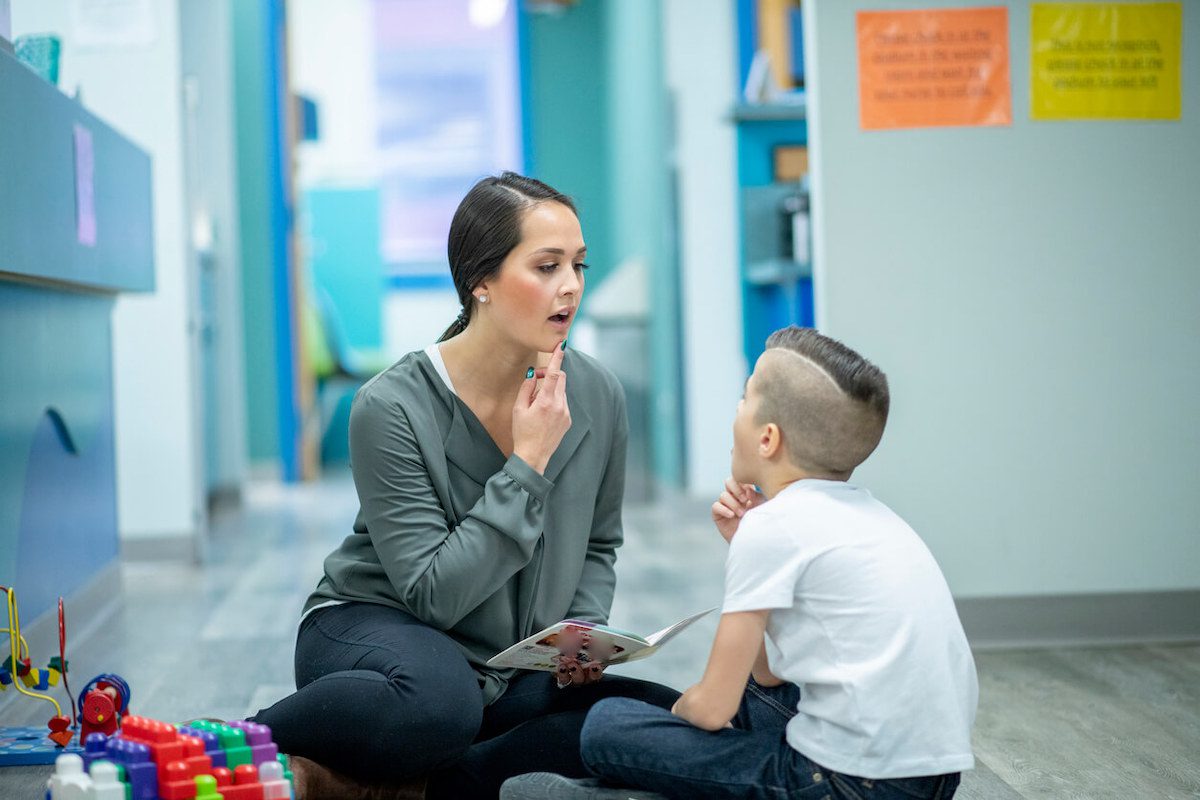As a parent, watching your child with speech or language development delays can be intimidating. You might wonder what’s causing your child to struggle and how you can help them reach age-appropriate milestones. Although it can feel like an overwhelming problem, understanding the causes of delayed speech and language development is the first step toward developing well-rounded communication skills for your little one.
In this blog post, we’ll walk you through some common causes of delayed language and offer tips for how parents can provide their children with support at every stage.
What Causes Speech Delay?
What Causes Speech and Language Delay? Speech and language delays are common among children. If your child is struggling with communication, it is crucial to understand what causes speech or language delays. Knowing the possible causes of delay can help you take the proper steps to get your child the help they need.

Possible Causes of Speech and Language Delays
There can be various reasons why a child may experience speech or language delays. Some potential causes include the following:
• Hearing Loss – Hearing loss can be caused by exposure to loud noises, ear infections, heredity, or other medical issues. If a child has difficulty hearing, this can impede their ability to learn how to speak clearly and accurately.
• Developmental Disabilities – Developmental disabilities such as autism spectrum disorder or Down syndrome and cerebral palsy can affect a child’s ability to communicate. A delay in speaking could indicate that your child has another developmental disability that needs further evaluation by a speech-language pathologist.
• Cognitive Delay – Sometimes, the leading cause of speech delay is cognitive development not keeping up with age-appropriate milestones. This could be due to genetics or other medical conditions that slow brain development and processing speed.
• Lack of Stimulation – If a child does not have enough exposure to communication and language early on in life, it could lead to delays in learning how to speak appropriately and use words correctly. Parents and caregivers must actively engage their children in conversation from an early age. Hence, they can learn proper communication skills at their own pace.
• Family History – A family history of speech delay is one of the most common causes of speech problems in children. Children may inherit certain genetic disorders that make it difficult for them to communicate effectively with others.

What Are Speech or Language Delays?
Speech and language delays are when a child does not meet typical speech milestones for development at the expected ages. These milestones can vary from one child to another based on age, gender, and developmental level. Generally speaking, however, if a child has not met specific milestones by two years old, they may be considered delayed.
What is Considered Delayed Speech?
Generally speaking, children should be able to produce meaningful words by two years old and should have developed a more extensive vocabulary by age 3. However, it could be considered a language delay if there is noticeable difficulty with speaking, understanding terms, or using words together in sentences more than six months after that age.
What Are the Signs of a Speech or Language Delay?
There are several signs that a child might be experiencing a delay in either speech or language development. Common symptoms include difficulty making simple sounds like “ma” or “ba” and trouble forming words that make sense; it’s also not uncommon for delayed children to struggle with understanding basic instructions (called receptive language).
Additionally, they may not use gestures such as pointing to show they understand what someone is saying. Suppose your child is exhibiting any of these behaviors. In that case, it could be an indication that there is a delay in their speech or language development which should be addressed by your pediatrician immediately.
Normal Speech Development
Speech development typically begins before birth, with a fetus starting to hear sounds in utero. Once born, babies will begin babbling by about six months of age, usually stringing together consonants and vowels such as “ba-ba,” “ma-ma,” and “da-da.”
At around 12 months, infants will be able to understand familiar words like “no” or “bye-bye” and use gestures such as pointing or clapping when prompted. By 18 months old, a toddler should have around 50 words in their vocabulary and be able to string together 2-3 word phrases like “Mommy come” or “More juice!”
By three years old, children usually have a vocabulary of 500 words and can form simple sentences such as “I want juice.” They will also be able to comprehend more complex questions such as “Where did you go?” or “What do you see?”
4-year-olds often understand storytelling better and can follow complex directions with multiple steps involved. This is also when they start using pronouns like “I,” “me,” or “you.” 5-year-olds can ask more questions than they can answer and may even talk too much! They should have a vocabulary of around 2000 words by now and be able to tell stories with characters.

How Are Speech or Language Delays Diagnosed?
The Age Factor
One of the most common indicators of speech delay is age. Generally speaking, children are expected to reach certain milestones in their speech development at specific ages. For example, by age 3, most children should have a vocabulary of about 200 words and string together basic sentences such as “I want milk” or “I like doggies.” If your child is not reaching these milestones by the expected age, it could be a sign of a delay that requires a further evaluation from a professional.
What Else Should You Look For?
In addition to age-related milestones, some other signs and symptoms may indicate a speech delay, such as difficulty pronouncing certain words or sounds, mixing up word order when speaking, and difficulty understanding language or following directions.
Suppose you observe any of these behaviors in your child. In that case, it may be time to speak with their doctor or pediatrician, who can refer them to an expert specializing in diagnosing and treating language disorders in children.
Testing For Speech Delays
When it comes to testing for speech delays in children, professionals typically use one or more standardized tests such as the Preschool Language Scale 5 (PLS-5), which evaluates language comprehension, production, and social communication skills between birth and seven years old; the Clinical Evaluation of Language Fundamentals (CELF); and the Test for Reception of Grammar (TROG).
These tests can help determine whether there are any underlying issues causing problems with speech development, such as hearing loss or autism spectrum disorder (ASD).

Everyday Tips to Support Your Child’s Speech Development
Talk Often with Your Child
One of the best ways to support your child’s speech development is by talking with them often. This helps them learn how words are used in everyday conversations and how they can express themselves clearly. It also allows them to practice using different sounds, tones, and pitches when speaking. Aim to talk about anything that interests your child—from what they did on their last playdate to what animals live in the ocean—and make sure you listen carefully when they respond.
Read Books Together
Reading stories together is an excellent way for parents and children to bond while developing language skills at the same time. Reading books also helps children understand new words and concepts they may not have encountered before, like rhyming or alliteration. When reading with your child, be sure to point out any unfamiliar words or ask questions about what’s happening in the story so that they can get more out of it.
Play Word Games
Word games are an excellent way for children to learn new vocabulary words and practice using them correctly. Try introducing simple word games like “I Spy” or “Hangman” whenever you have a few minutes free together, or create some word puzzles based on topics your child enjoys discussing (e.g., animals or sports). You can also look up online resources such as interactive apps or worksheets explicitly designed for teaching children new words and phrases related to their interests or daily routines.

Hearing Problems Can Delay Speech Development in Toddlers
Hearing problems can dramatically impact speech and language development, especially during the early years of childhood development. Children who don’t hear accurately struggle to learn words and recognize sounds correct, which delays their language development. This can be particularly concerning for children with ASD (Autism Spectrum Disorder) because communication difficulties are often one of the primary symptoms of autism spectrum disorder. Studies have found that up to 67% of children with ASD also experience hearing loss.
Early Intervention Services for Speech and Language Disorders
Fortunately, there are steps you can take to help identify potential hearing issues and get your child on the right track for success. Early detection is critical to preventing delays in your child’s language development, so ensure you bring them in for regular auditory screenings throughout infancy and toddlerhood. Regular screenings will also give you peace of mind; if an issue is identified, appropriate interventions can be implemented quickly and effectively so that no time is wasted in getting your child back on track with their developmental milestones.
How Parents Can Help
Parents play a significant role in helping their children overcome any challenges related to speech or hearing difficulties. While specialized interventions from professionals may be necessary, parents can also use many simple strategies at home. For example, talking directly to your little one—using clear enunciation and emphasizing important words—can help them better understand what you’re saying and improve their communication ability. Reading aloud together is another great way to engage with your toddler while teaching them new words and concepts that could help jumpstart their language acquisition process.

Final Thoughts
Speech development is an important milestone for every child, and paying close attention to what causes speech delays is essential to help your little one thrive. For example, suppose you suspect your toddler may be experiencing a delay. In that case, the best action is to seek professional advice from a speech therapist or specialist who can evaluate them and determine what’s causing the problem. Once an underlying cause is identified, you can then work together to create a plan to support your child’s speech development and help them reach their full potential.
Remember that every child develops at their own pace, so it’s important not to compare your little one with peers or other children in their age group. With the proper support, your child can make great strides as they develop their language skills. With patience and perseverance, you can help give your child a strong foundation in communication and language that will serve them throughout their life.
Frequently Asked Questions
At what age is speech considered delayed?
When it comes to language development, every child is unique. On average, toddlers gain the ability to speak basic words like "no" and "stop" by their third birthday, while more complex sentences may not be mastered until they reach 12 or 15 years old. No matter when communication begins though, speech milestones are always a cause for celebration.
Can speech delay be fixed?
Supporting children as they learn to communicate is integral to their development. From simple sound (called expressive language) and gesture-based activities with family members, young ones can overcome language delays - making it easy for them to express themselves sooner rather than later.
Can a toddler have a speech delay and not be autistic?
While Autism Spectrum Disorder (ASD) can come with language or speech delays, having a communication delay doesn't necessarily mean that ASD is present. Speech difficulties may arise due to underlying communication problems rather than being an indicator of the condition itself.
At what age should you worry about a child not talking?
If your little one isn't speaking up to par by the time they reach four, a check-in with the doctor may be in order. But, of course, by then, even strangers should understand what's being said.




